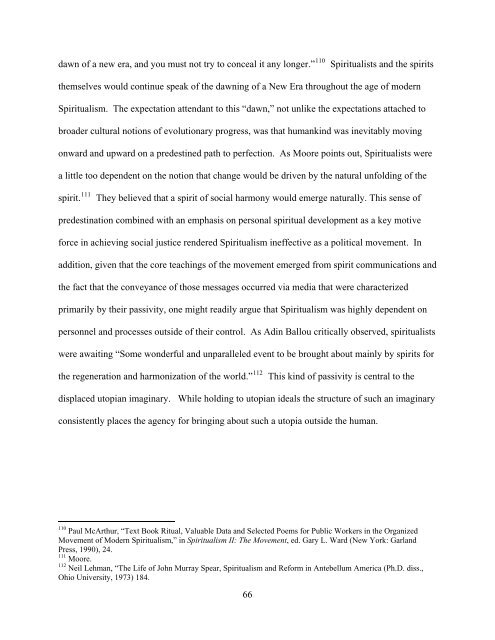A Genealogy of the Extraterrestrial in American Culture
A Genealogy of the Extraterrestrial in American Culture
A Genealogy of the Extraterrestrial in American Culture
Create successful ePaper yourself
Turn your PDF publications into a flip-book with our unique Google optimized e-Paper software.
dawn <strong>of</strong> a new era, and you must not try to conceal it any longer.” 110<br />
Spiritualists and <strong>the</strong> spirits<br />
<strong>the</strong>mselves would cont<strong>in</strong>ue speak <strong>of</strong> <strong>the</strong> dawn<strong>in</strong>g <strong>of</strong> a New Era throughout <strong>the</strong> age <strong>of</strong> modern<br />
Spiritualism. The expectation attendant to this “dawn,” not unlike <strong>the</strong> expectations attached to<br />
broader cultural notions <strong>of</strong> evolutionary progress, was that humank<strong>in</strong>d was <strong>in</strong>evitably mov<strong>in</strong>g<br />
onward and upward on a predest<strong>in</strong>ed path to perfection. As Moore po<strong>in</strong>ts out, Spiritualists were<br />
a little too dependent on <strong>the</strong> notion that change would be driven by <strong>the</strong> natural unfold<strong>in</strong>g <strong>of</strong> <strong>the</strong><br />
spirit. 111<br />
They believed that a spirit <strong>of</strong> social harmony would emerge naturally. This sense <strong>of</strong><br />
predest<strong>in</strong>ation comb<strong>in</strong>ed with an emphasis on personal spiritual development as a key motive<br />
force <strong>in</strong> achiev<strong>in</strong>g social justice rendered Spiritualism <strong>in</strong>effective as a political movement. In<br />
addition, given that <strong>the</strong> core teach<strong>in</strong>gs <strong>of</strong> <strong>the</strong> movement emerged from spirit communications and<br />
<strong>the</strong> fact that <strong>the</strong> conveyance <strong>of</strong> those messages occurred via media that were characterized<br />
primarily by <strong>the</strong>ir passivity, one might readily argue that Spiritualism was highly dependent on<br />
personnel and processes outside <strong>of</strong> <strong>the</strong>ir control. As Ad<strong>in</strong> Ballou critically observed, spiritualists<br />
were await<strong>in</strong>g “Some wonderful and unparalleled event to be brought about ma<strong>in</strong>ly by spirits for<br />
<strong>the</strong> regeneration and harmonization <strong>of</strong> <strong>the</strong> world.” 112<br />
This k<strong>in</strong>d <strong>of</strong> passivity is central to <strong>the</strong><br />
displaced utopian imag<strong>in</strong>ary. While hold<strong>in</strong>g to utopian ideals <strong>the</strong> structure <strong>of</strong> such an imag<strong>in</strong>ary<br />
consistently places <strong>the</strong> agency for br<strong>in</strong>g<strong>in</strong>g about such a utopia outside <strong>the</strong> human.<br />
110 Paul McArthur, “Text Book Ritual, Valuable Data and Selected Poems for Public Workers <strong>in</strong> <strong>the</strong> Organized<br />
Movement <strong>of</strong> Modern Spiritualism,” <strong>in</strong> Spiritualism II: The Movement, ed. Gary L. Ward (New York: Garland<br />
Press, 1990), 24.<br />
111 Moore.<br />
112 Neil Lehman, “The Life <strong>of</strong> John Murray Spear, Spiritualism and Reform <strong>in</strong> Antebellum America (Ph.D. diss.,<br />
Ohio University, 1973) 184.<br />
66















